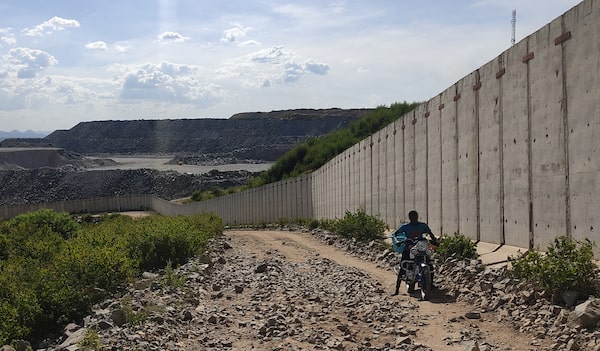
A public road near the North Mara mine in Tanzania.Handout
Two law firms have filed suit against Barrick Gold Corp. ABX-T in Ontario Superior Court on behalf of 21 Tanzanians who allege that they or their family members were killed, injured or tortured by police guarding a Barrick gold mine.
The case, filed on Wednesday morning, is the first to be pursued against Barrick in Canadian courts for alleged human rights violations at its mines abroad. It follows a landmark Supreme Court of Canada ruling in 2020 that allowed a Vancouver-based mining company to be sued in British Columbia for alleged abuses in Eritrea.
The Tanzanian plaintiffs, Indigenous Kurya villagers who live in communities around Barrick’s North Mara gold mine in northern Tanzania, are accusing the police of five deaths, five injuries and five incidents of torture. They say Barrick is liable because the police are paid and equipped by Barrick under a formal agreement between the company and the Tanzanian Police Force.
Barrick Gold faces new allegations of police violence around Tanzania mining site
Barrick says it does not supervise or control the police who patrol outside the mine, and it denies responsibility for the actions of the police. It also says any police assigned to the mine site are required to undergo training on human rights. But in a report in 2020, Barrick acknowledged that the police receive “support” from the company under the terms of the written agreement. It did not provide details of the support.
A corporate watchdog group, Rights and Accountability in Development (RAID), says it has interviewed Tanzanian police officers and a former North Mara security officer who all confirmed that the mine provides payments, equipment, food and housing to about 150 heavily armed police officers who are deployed around the mine and are often stationed in the mine’s central control room.
The Globe and Mail has documented police-related violence around the North Mara mine for more than a decade. A Tanzanian government inquiry said in 2016 that it had heard reports of 65 deaths and 270 injuries caused by police at the mine. A court case, still under way, was launched against a Barrick subsidiary in Britain in 2020 on behalf of Tanzanians alleging that the police caused deaths and injuries between 2014 and 2019.
Three years ago, Barrick took direct control of North Mara. It says it has radically improved its community relations and security procedures since then. But the latest lawsuit claims that the deaths and injuries have continued since 2019.
Joe Fiorante, one of the lawyers who filed the lawsuit in Toronto on Wednesday on behalf of the Tanzanians, said it was important to launch the case in the city where Barrick has its headquarters, since Barrick has repeatedly claimed to have “zero tolerance” for human rights abuses.
“We are attempting to hold the parent companies, the headquarters, to their own self-proclaimed human rights and security standards,” Mr. Fiorante told The Globe in an interview.
“If we’re able to make progress against a company as large as Barrick, it will definitely send a message to the entire industry that mining companies need to abide by these human rights and security standards,” said Mr. Fiorante, who represented the Eritrean plaintiffs in the case that reached the Supreme Court of Canada and eventually led to a settlement with the mining company in 2020.
Kathy du Plessis, a spokesperson for Barrick, said the company had received the statement of claim from the law firms and found it “riddled with inaccuracies.” She repeated the company’s longstanding insistence that it does not exercise any control over the Tanzanian police. “We intend to vigorously defend against these allegations in the appropriate forum,” she said.
Barrick CEO Mark Bristow, in an interview with The Globe earlier this month, said the allegations of human rights abuses at North Mara are “nonsense” and “mischievous.” The corporate watchdog groups that support the Tanzanian villagers “make it a business of stomping around and making accusations,” he said.
“We’ve [said] to them, ‘If you’re making these accusations, go to a court and get a competent authority to pass a judgment on this,’ " Mr. Bristow said. “But right now, none of the things have been substantiated.”
Mr. Bristow said he has held several meetings with community leaders at North Mara. “And if this was a crisis, we would see it.”
In a conference call with analysts and investors last week, Grant Beringer, group sustainability executive at Barrick, said the relationship between the mine and the community at North Mara has “improved significantly.” He said an independent report by a consulting firm, Synergy Global Consulting, found “significant measurable progress in relation to security forces management.”
But the corporate watchdog groups say that Barrick is too quick to dismiss the complaints.
“Tanzanian communities have been left with little choice but to turn to Canadian courts for justice and an end to the mine’s culture of violence,” said Anneke Van Woudenberg, executive director of RAID, which is supporting the Tanzanian villagers but is not formally involved in the lawsuit.
“This case is an important test of whether Canada is prepared to hold its own companies to account for wrongdoing, or whether its legal commitments to human rights are set aside when it comes to people harmed by Canadian companies operating abroad,” she said.
Catherine Coumans, research co-ordinator at MiningWatch Canada, said it is “tragic” that violence by mine security at North Mara has continued for more than a decade. “The sheer scale of the losses has left deep scars in all of the communities around the mine,” she told The Globe. “It is very important that this case has been filed in Barrick’s home country where Barrick is seen as a flagship company and receives a lot of political support.”
The lead counsel in the latest case are Mr. Fiorante of the Vancouver firm CFM Lawyers and Cory Wanless of the Toronto firm Waddell Phillips. Both were involved in several previous human-rights cases against Canadian mining companies.
Two years ago, in one of those cases, the Supreme Court of Canada ruled that Vancouver-based Nevsun Resources Ltd. could be sued in British Columbia for allegations of forced labour and other human rights abuses at its mine in Eritrea, one of the world’s most repressive states. The ruling was considered a historic precedent for corporate liability by Canadian companies with operations abroad.
Despite the long history of alleged killings and human rights abuses at North Mara, the mine and other gold mines in Tanzania remain important to Barrick, which hopes that they will soon gain “Tier 1″ status – a category of mines with large production, long-life assets and low costs. Barrick hopes that North Mara can achieve reliable production of 300,000 ounces of gold a year over the next decade.
Barrick, however, has had a checkered history of operating in Africa, and a mixed record of success. More than a decade ago, Barrick had spun out a sizable stake in its African portfolio to a separated publicly traded unit called Acacia Mining PLC. But after Acacia clashed with the Tanzanian government, and ran into financial difficulties, Barrick decided to buy back Acacia in 2019.
Just prior to taking back Acacia, Barrick had decided to take a fresh bet on Africa. In the fall of 2018, Barrick announced it was buying Randgold Resources Ltd., whose entire portfolio of mines was in Africa.
Barrick’s current CEO, Mr. Bristow, previously ran Randgold. Unlike some of his predecessors at Barrick, he is comfortable running mines in Africa. He grew up in South Africa, led Randgold’s African mines for two decades and takes great pride in Barrick’s African portfolio.
Mr. Bristow is also known for embracing jurisdictions where the geology is superb, even if the geopolitical climate is far from ideal. Earlier this year, Mr. Bristow said in a conference call, “there’s an old saying that if you’re looking for elephants, you have to go to elephant country. We’ve searched for and found Tier 1 assets in parts of the world that presented challenges that daunted other mining companies and then proceeded to successfully develop and operate them.”
 Geoffrey York
Geoffrey York Niall McGee
Niall McGee